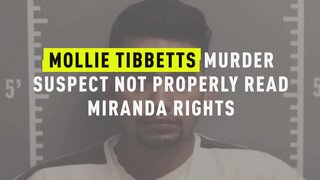Create a free profile to get unlimited access to exclusive videos, breaking news, sweepstakes, and more!
Mollie Tibbetts' Accused Killer Wasn't Properly Read Miranda Rights, Which May Affect Trial
Cristhian Bahena Rivera’s lawyers are pushing to have some evidence suppressed in their client’s trial for the murder of Mollie Tibbetts.

A number of statements likely will not be considered in the trial of Cristhian Bahena Rivera, the man accused of killing college student Mollie Tibbetts, due to authorities reportedly failing to properly read the suspect his Miranda rights.
Tibbetts, a 20-year-old student at the University of Iowa, disappeared on July 18, 2018 while out jogging in the Brooklyn, Iowa area. Her body was discovered in a cornfield a month later. Rivera, a farm hand, was arrested for allegedly stabbing her to death, and has since pleaded not guilty to a first-degree murder charge.
As Rivera’s case moves toward a jury trial, his lawyers have argued that officers violated their client’s rights by failing to read him his rights in full following his arrest on Aug. 20, 2018, the Des Moines Register reports. In court documents filed Friday, prosecutors for the state agreed that the officer who arrested Rivera at around 11:30 p.m. and read him his rights “inadvertently” neglected to tell Rivera that anything he said could later be used against him in court, according to the outlet; Rivera reportedly had his rights read to him a second time, in full, at around 5:50 a.m. the following day, when he was seated in a car near the area where Tibbetts’ remains were found.
Both the prosecution and the defense have agreed that anything Rivera said between 11:30 p.m. and 5:50 a.m. — the time between the first reading of his rights and the second — shouldn’t be admissible as evidence, the Register reports. However, prosecutors are arguing for the right to refer to anything said during that time frame to respond to testimony, while the defense wants those statements to be fully suppressed, according to the outlet.
An arrest affidavit obtained by Oxygen.com states that Rivera is alleged to have approached Tibbetts while she was out on her run that evening, and he grew angry after she threatened to call the police. Rivera allegedly told police that he blacked out, and when he regained consciousness, Tibbetts’ bloodied body was in the trunk of his car, and he dragged her remains from his car to the cornfield where she was found.
Rivera’s lawyers have argued that there exists “a number of concerning factors” in Rivera’s case, according to the Register. They’ve reportedly alleged that their client was led to believe that confessing would be in his favor, a tactic they said could “induce false confessions” leading to wrongful convictions.
They also claimed that one of the officers told Rivera during his interview, “Help yourself, do it for yourself, think about you. Think about your daughter that will need you. Right now, don’t you see that little face of that little girl?”
Prosecutors responded Friday by arguing that Rivera’s confession was not coerced, and that he repeatedly connected himself to Tibbetts’ killing while he was in custody, according to the Register. Rivera, they said, has painted himself as “the killer, not a false confessor.”
A judge is expected to rule on what evidence will be admissible at trial during a suppression hearing on Oct. 22, where Rivera will be present, the Register reports. That hearing will last from Tuesday to Thursday, according to Des Moines’ KCCI.
The Iowa Attorney General's office did not immediately respond when asked to comment on the matter, according to the Register.
Rivera’s trial is scheduled to begin at some point in February, per the outlet.





















